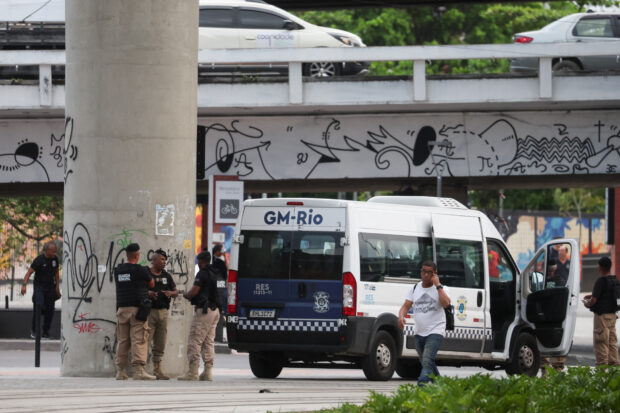Rio de Janeiro hostage-taker surrenders, frees captives

Municipal guards gather near the bus terminal station after a man hijacked a bus with passengers, in Rio de Janeiro, Brazil, March 12, 2024. REUTERS/Pilar Olivares
Rio de Janeiro, Brazil — A gunman who shot and wounded two people and took 17 passengers hostage Tuesday at the main bus station in Rio de Janeiro surrendered and freed his captives after negotiations, Brazilian police said.
“The hostage-taker surrendered, he was arrested, all the hostages were released, they are safe,” said Colonel Marco Andrade of the military police.
READ: Cops save 5-year-old boy after man holds him hostage in Pasig
Earlier, police said agents from the elite Special Operations Battalion (BOPE) unit were “conducting negotiations on site” after “a man shot two people and took hostages on a bus at the Novo Rio bus station.”
The wounded were taken to hospital.
Article continues after this advertisementIn total, 17 people were held, including children and elderly, Andrade told reporters outside the station. He said one person had been shot three times, while another had lesser injuries.
Article continues after this advertisementPolice have not released the identity of the gunman or his motives.
‘Everyone is desperate’
Images broadcast by the Globonews channel showed chaos at the station in the center of Rio, where buses leave for all regions of Brazil, with police deployed around the area.
“A man drew a gun, started shooting and entered the bus. I have two friends on this bus, everyone is desperate, we don’t know what will happen,” a witness told the broadcaster.
Television footage showed a blue bus stopped in the middle of an empty parking lot.
The terminal was closed after all passengers and employees were evacuated, AFP witnessed.
In 2000, a hostage situation on a bus in a residential area of Rio left two people dead.
The incident kept the nation rapt as it was broadcast live on television for hours, and inspired the 2008 movie “Last Stop 174.”
In 2019, a hijacker armed with what turned out to be a fake gun was shot and killed by police in Rio after he held a busload of passengers hostage for several hours on a major bridge linking the city to the town of Niteroi.
Brazil’s most iconic city, Rio de Janeiro has long been plagued by high crime rates linked to poverty and inequality.
Rio’s sprawling favelas, which crowd the metropolitan area’s hillsides, often overlooking picture-postcard beaches and lush mountains, are the epicenter of gang and drug-related violence.